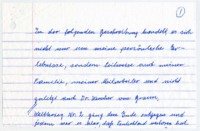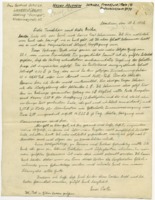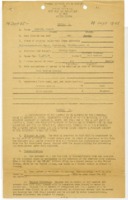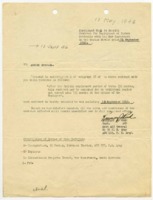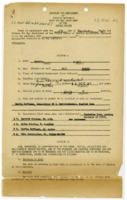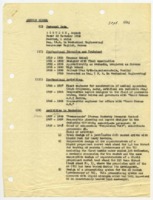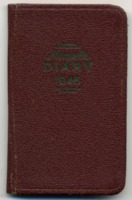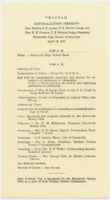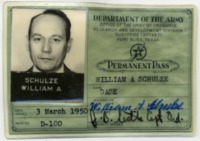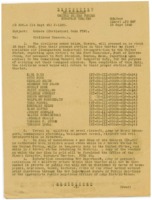
Browse Items (27 total)
Sort by:
-
Autobiography and résumé of William August Schulze.
In this partial autobiography, Schulze describes his experiences growing up in Neulaubusch, Germany and training and working as an engineer. He notes that he began working for Wernher von Braun at Kummersdorf in 1936 and then moved to Peenemünde, where he worked on the A-3, A-5, A-7, and V-3 rockets. The documents also include a lengthy handwritten excerpt from Schulze's 1945 day book and a résumé. Includes a transcription and a partial English translation. -
Letter from August Schulze in Aberdeen, Maryland to Trude and Erika Schulze in Landshut, Bavaria, Germany.
Schulze wrote this letter to his wife, Trude, and daughter, Erika, on the back of a photostat copy of his War Department Notification of Personnel Action. In the letter, he discusses his pay and accommodations with the U. S. Army. -
Special Contract for Employment of German Nationals with the War Department in the United States.
This special contract outlines the conditions of August Schulze's employment as an engineer in the United States. The document also includes instructions regarding the engineers' housing, dependents, mail, termination of contract, and burial. -
Supplements to Special Contract for Employment of German Nationals with the War Department in the United States.
The two supplements extend August Schulze's employment in the United States to November 21, 1946. On the back of Supplement No. 2, Schulze lists amenities and their prices. -
Contract for Employment of Foreign Nationals with the War Department of the United States.
This contract outlines employee benefits, policies regarding the movement of dependents from Germany to the United States, and conditions of secrecy, noting that "as a condition to admittance to this country and employment hereunder, employee agrees to observe such security measures as the President of the United States may direct with respect to the project here involved." The contract also includes an enclosure clarifying that Schulze's wife and daughter may move to the United States as soon as possible. -
Résumé of August Schulze.
This résumé outlines Schulze's professional activities and activities in rocketry. The document notes his interrogation by the United States and outlines plans for his "Contemplated Activity" as "Chief of the Subsection 'Thrust Unit'." -
1946 day book.
Written by William A. Schulze, this day book includes notes from his activities at Army Proving Ground at Aberdeen, Maryland in early 1946. Schulze was transported from Germany to Aberdeen in late 1945 as part of the first group of German engineers sent to the United States. During the week of March 17-23, Schulze records his travel from Aberdeen to El Paso, Texas, leaving on Monday, March 18, and arriving in Texas on Thursday, March 21. The day book includes entries on shopping, leisure activities, birthdays, and mail. Schulze's notes reference H. N. Toftoy, Konrad Dannenberg, Wilhelm Jungert, Hannes Luehrsen, Theo Poppel, Erich Neubert, Walter Schwidetski, and others. -
Naturalization ceremony program.
Held at the Huntsville High School auditorium, the ceremony naturalized many of the German engineers who were transferred to Huntsville in 1950. -
Department of the Army Permanent Pass.
This pass was issued by the Office of the Chief of Ordnance, Research and Development Division Suboffice (Rocket), at Fort Bliss, Texas. -
Orders for the transportation of seventeen German civilians to the United States.
This document identifies the first group of German engineers to be brought to the United States as part of Operation Paperclip. Seven of the men listed were eventually transported to the U. S. Army post at Fort Bliss, Texas: Wernher von Braun, Wilhelm Jungert, Erich Neubert, Theo Poppel, Eberhard Rees, August Schulze, and Walter Schwidetski. The men were transported from Germany by air and then by train once in the United States.
